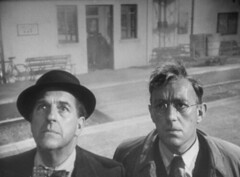"In whatever motion the particles of the principle elements are now, in that same motion they also were in past ages and hereafter will be carried along in the same way, and those things which are usually born will be born again under the same conditions . . . ."
- Lucretius, "De Rerum Natura" (Bk. 2)
The Paris gendarmerie are on it - on this fateful Vendredi le troisieme just past they siezed 13 tons of miniature Eiffel Tower souvenirs from a shop owner, her husband and her son, who were arrested for selling the trinkets sans permis at tourist spots including the Louvre and the Eiffel Tower. The sting by French customs, social security and the police transport division followed several months of surveillance. Police say the boutique illegally rakes in some €1 million ($1.31 million) per year.
- Lucretius, "De Rerum Natura" (Bk. 2)
The Paris gendarmerie are on it - on this fateful Vendredi le troisieme just past they siezed 13 tons of miniature Eiffel Tower souvenirs from a shop owner, her husband and her son, who were arrested for selling the trinkets sans permis at tourist spots including the Louvre and the Eiffel Tower. The sting by French customs, social security and the police transport division followed several months of surveillance. Police say the boutique illegally rakes in some €1 million ($1.31 million) per year.
It is not for me to say what the Paris police should be looking out for, nor what the proper focus of the French Customs Office should be, whether a souvenir shop trumps the Le Havre or Marseilles docks, or the freight terminal at Orly, for example. The story caught my eye only because it reminded me of another caper, this one also involving souvenirs of miniature Eiffel Towers. In a 1951 comedy from the old Ealing Studios in London, Alec Guiness and Stanley Holloway devise a scheme to smuggle enough gold out of a London bank to last them a luxurious lifetime abroad.
Guiness plays Henry Holland, a timid and meticulous London bank clerk, for two decades in charge of gold bullion deliveries at his bank. He appears to be dedicated but in fact has hatched a perfect plot to steal a single shipment of bullion and retire. But even if the theft comes off, Holland is at a loss how to smuggle it out of England.
Enter a new lodger, artist Alfred Pendlebury (Holloway), at the boarding house where Holland lives in Lavender Hill. Pendlebury owns a foundry that makes and ships the sorts of souvenirs sold in resorts - Paris, for example. Noticing how similar Pendlebury's foundry operation is to how the gold is melted into ingots, Holland decides that the ideal way to smuggle gold out of the country would be to cast it into miniature Eiffel Tower paperweights. Once recast and shipped off to France as souvenirs, they could be retrieved without attracting notice, recast into ingots, and Bob's your uncle, Paris (or Rio) your oyster. Pendlebury is easily persuaded. "By Jove, Holland," he exults, "it's a good job we're both honest men."
"It is indeed, Pendlebury." And so the plot is hatched and carried off with ease - until the shipment of little Eiffel Towers is delivered by mistake to a licensed souvenir shop at the base of the Eiffel Tower where, when the two miscreants stumble upon the scene, a group of British schoolgirls is each singly delighted with her shiny souvenir. The game is afoot, the chase is on, and that's all I'm going to divulge, except to say that in this caper, like the real-life episode of Friday the 13th, the police were involved. Paris is the city of eternal recurrence.
Pendlebury & Holland (looking for the remaining miniature at large)
Paris, the world, and life itself. As Nietzsche in The Gay Science already cautioned, "This life as you now live it and have lived it, you will have to live once more and innumerable times more; and there will be nothing new in it . . . . The eternal hourglass of existence is turned upside down again and again, and you with it, speck of dust!"
Fine, I can live with that - as long as I end up in Paris, and not the "other place."
Fine, I can live with that - as long as I end up in Paris, and not the "other place."



No comments:
Post a Comment